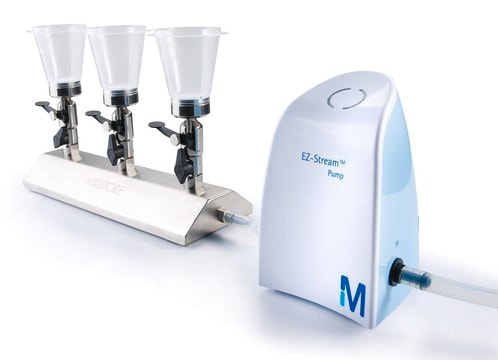W248703
Formic acid
≥95%, FCC, FG
Synonym(s):
Acide formique, Ameisensaeure, Aminic acid, Formisoton, Formylic acid, Methanoic acid, Sybest
About This Item
Halal
Kosher
Recommended Products
biological source
synthetic
Quality Level
grade
FG
Halal
Kosher
Agency
meets purity specifications of JECFA
reg. compliance
EU Regulation 1334/2008 & 178/2002
FCC
FDA 21 CFR 117
FDA 21 CFR 172.515
vapor density
1.6 (vs air)
vapor pressure
44.8 mmHg ( 20 °C)
Assay
≥95%
form
liquid
autoignition temp.
1004 °F
expl. lim.
57 %
refractive index
n20/D 1.370 (lit.)
pH
2.2 (20 °C, 2.2 g/L)
bp
100-101 °C (lit.)
mp
8.2-8.4 °C (lit.)
density
1.22 g/mL at 25 °C (lit.)
anion traces
sulfate (SO42-): ≤0.004%
cation traces
As: ≤3 ppm
Cd: ≤1 ppm
Hg: ≤1 ppm
Pb: ≤10 ppm
application(s)
PFAS testing
flavors and fragrances
Documentation
see Safety & Documentation for available documents
food allergen
no known allergens
Organoleptic
pungent; vinegar
SMILES string
OC=O
InChI
1S/CH2O2/c2-1-3/h1H,(H,2,3)
InChI key
BDAGIHXWWSANSR-UHFFFAOYSA-N
Looking for similar products? Visit Product Comparison Guide
General description
Application
- Quantitative Analysis of Residual Butylated Hydroxytoluene and Butylated Hydroxyanisole in Salmo Salar, Milk, and Butter by Liquid Chromatography-Tandem Mass Spectrometry.: In this study, formic acid is used in the preparation of samples for liquid chromatography-tandem mass spectrometry analysis. The research focuses on the detection and quantification of antioxidant residues in food products, contributing to food safety and quality control protocols (Galal et al., 2024).
Signal Word
Danger
Hazard Statements
Precautionary Statements
Hazard Classifications
Acute Tox. 3 Inhalation - Acute Tox. 4 Oral - Eye Dam. 1 - Flam. Liq. 3 - Skin Corr. 1A
Supplementary Hazards
Storage Class Code
3 - Flammable liquids
WGK
WGK 1
Flash Point(F)
121.1 °F - closed cup
Flash Point(C)
49.5 °C - closed cup
Personal Protective Equipment
Choose from one of the most recent versions:
Already Own This Product?
Find documentation for the products that you have recently purchased in the Document Library.
Customers Also Viewed
Our team of scientists has experience in all areas of research including Life Science, Material Science, Chemical Synthesis, Chromatography, Analytical and many others.
Contact Technical Service







